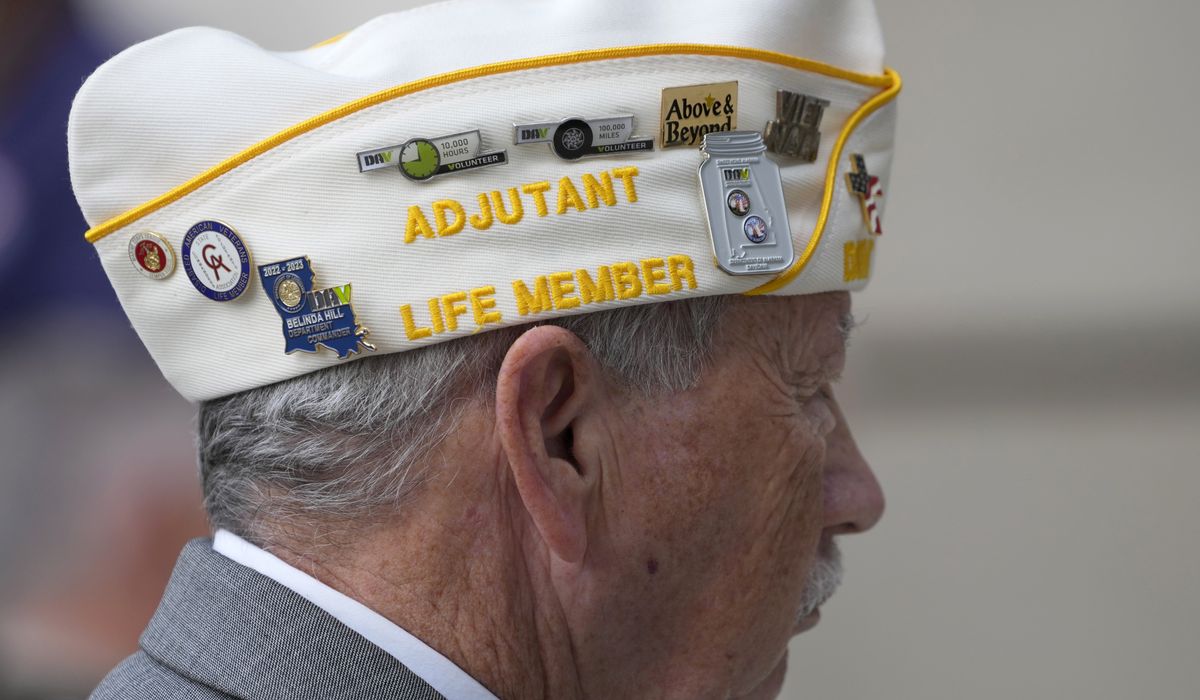


Saying “Thank you for your service,” after learning that someone served in the military has become commonplace, but many veterans say the phrase has become so rote that it’s little more than a reflex statement, like saying “gesundheit” after someone sneezes.
A new survey of active-duty and retired military personnel out this week finds many who serve or served in uniform appreciate the sentiment but are looking for a new way to express it.
Some 70% of younger military veterans report feeling uncomfortable or awkward when someone says, “Thank you for your service,” according to a poll commissioned by the military-focused financial services company USAA. There’s a stark generational divide at work — the same survey found that three-quarters of veterans 65 and older say they welcome the comment.
Because Nov. 11 is a Saturday this year, the federal government will mark Veterans Day with a holiday Friday. Wreath-laying ceremonies are set for Saturday in the Washington area at Arlington National Cemetery, at memorials honoring World War II veterans, Korean War veterans and women who served in the military, and at sites like Mount Vernon and the National Cathedral.
Even so, the USAA poll, which questioned some 1,639 military veterans and those still in uniform, also found that 28% of civilians are either unaware of Veterans Day or aren’t sure why people celebrate it.
A military veteran who identified himself online as “SnooStories2744” said Veterans Day makes him sad because most civilians just use the day to have a party.
“I also hate hearing ‘Thank you for your service.’ Don’t thank me. … How about you lend an ear to a local old veteran and listen to his stories and knowledge?” the veteran said on Reddit, a social network website. “Why don’t you volunteer to assist vets in need?”
He won’t tell people about his military service because the questions he receives “are so ignorant.”
“If they aren’t a vet, they simply don’t get it,” the Reddit poster said. “Nothing against them.”
Katy Dondanville, a clinical psychologist at the U.T. Health Science Center in San Antonio, Texas, said establishing personal connections is a critical component to veterans’ mental health.
“Rather than simply offering our thanks, we should be looking for ways to go beyond small talk and create more meaningful connections with veterans and better understand their service,” she said.
John Worsencroft, a history professor at Louisiana Tech University who served with the Marine Corps in Iraq, said, “Thank you for your service,” and similar comments are cultural rituals that may be heartwarming but offer little tangible support to veterans. He said the hallmark of actual support in exchange for military service was the G.I. Bill, passed during World War II that provided benefits for an untold number of veterans.
“Millions of service members received monthly cash payments after they mustered out of the military, accessing low-interest loans to start businesses, as well as low-cost mortgages and, the most celebrated benefit, money for college,” Mr. Worsencroft wrote recently in The Washington Post. “This not only recognized the scale of their contributions to the United States, but because of the sheer size of the returning veteran population, the G.I. Bill became an engine of postwar economic growth in the United States.”
Younger veterans are more likely to connect on social media forums like Reddit or Instagram, while older veterans still prefer to meet up in person, according to the survey.
“This data shows that military service members and our veterans want Americans to go beyond small talk to connect with them on a deeper level, including learning more about their service [and] honoring each veteran’s service in ways in which they feel comfortable talking about,” said retired Army Maj. Gen. Robert F. Whittle, USAA’s senior vice president.
Michael B. Brennan, the clinical director at Rush University Medical Center in Chicago and a military veteran, said he heard a range of opinions, pro and con, regarding the “Thank you for your service” debate. Each side has a valid perspective, Dr. Brennan said in an essay for Psychology Today magazine.
He recalled usually feeling honored when someone said it to him when he was on active duty. Although he never saw combat, Dr. Brennan said he still took great pride in wearing the uniform and appreciated being recognized for his military service — in most cases.
“I would often feel uncomfortable about running errands after work because if I entered a store, a restaurant or other establishment that was away from a military installation, I would usually stick out,” he wrote. “I often felt awkward and hyperconscious, like people were staring at me or that I always had to be on my best behavior so that I represented the Army in a positive way.”
Advocates say there are a number of ways to show support to veterans, beyond offering them thanks for their service. They run the gamut from picking up the tab for a vet at a restaurant, attending Veterans Day events, shopping at veteran-owned businesses, or volunteering at organizations that support veterans.
In the end, however, telling veterans their service and sacrifice are appreciated is, on balance, a good thing, Dr. Brennan said, whatever words are used.
“Many civilians and veterans alike have good intentions when they say the phrase, ‘Thank you for your service.’ In most cases, it is highly likely that their intentions are to acknowledge the sacrifice and selfless service that many veterans and service members have made,” he said.
• Mike Glenn can be reached at mglenn@washingtontimes.com.
